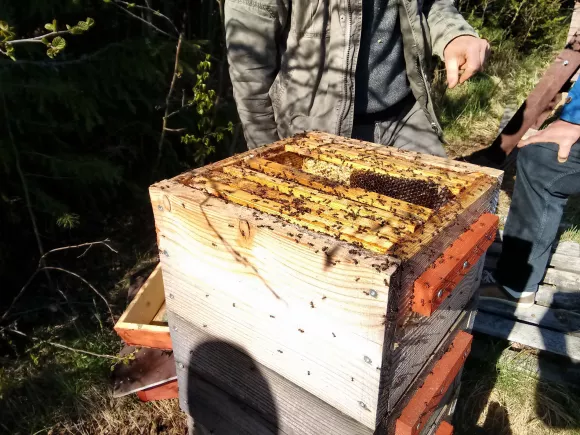Natural Beekeeping
Natural Beekeeping: Harmonizing Permaculture and Apiculture - Embracing Sustainable and Ethical Beekeeping Practices in Permaculture Systems.
Natural beekeeping, sometimes referred to as "bee-centric" or "holistic" beekeeping, is an approach to apiculture that prioritizes the health and well-being of honeybees, while integrating them into permaculture systems. This method seeks to create a harmonious relationship between bees, plants, and humans, fostering biodiversity and resilience.
Principles of Natural Beekeeping
Natural beekeeping differs from conventional apiculture in several key aspects. The main principles include:
- Mimicking natural habitats: Providing bees with hive designs that closely resemble their natural nesting sites, such as log hives or top-bar hives, which promote healthier colonies and reduce stress.
- Minimal intervention: Allowing bees to build their own comb, regulate their own population, and adapt to local conditions without excessive interference from the beekeeper.
- Chemical-free management: Avoiding synthetic chemicals and pesticides, and instead opting for natural treatments and practices to maintain hive health.
- Sustainable honey harvesting: Prioritizing the needs of the bees and ensuring they have sufficient honey stores before any surplus is harvested.
- Biodiversity and habitat: Creating diverse and pesticide-free environments for bees to forage, nest, and reproduce, promoting overall ecosystem health.

The Role of Bees in Permaculture
Honeybees play a vital role in permaculture systems, as they are exceptional pollinators that contribute to increased plant diversity, productivity, and overall ecosystem health. Integrating bees into a permaculture design involves:
- Planting diverse flowering species: Providing a continuous supply of nectar and pollen throughout the growing season, ensuring bees have access to a varied diet.
- Creating habitats: Incorporating nesting sites for both honeybees and native pollinators, such as bee hotels, logs, and hollow trees.
- Integrating bees into the design: Considering the needs and behavior of bees when designing the landscape, such as planting windbreaks, creating water sources, and positioning hives with the sun's path in mind.
- Promoting natural pest control: Encouraging beneficial insects and predators, and practicing integrated pest management to minimize the use of harmful chemicals.
Benefits of Natural Beekeeping in Permaculture
Adopting a natural beekeeping approach in permaculture systems offers numerous benefits, including:
- Healthier bee colonies: By reducing stress and providing a more natural environment, bees are better equipped to fight diseases and pests, leading to stronger and more resilient colonies.
- Enhanced pollination: A thriving bee population contributes to increased pollination and greater yields for fruit, vegetable, and nut crops.
- Biodiversity: Supporting a diverse range of flowering plants and other pollinators creates a more resilient and productive ecosystem.
- Environmental stewardship: Natural beekeeping practices contribute to a healthier environment by reducing the reliance on synthetic chemicals and promoting sustainable land management practices.
- Ethical honey production: Ensuring the well-being of bees and prioritizing their needs leads to the responsible and sustainable production of honey and other hive products
